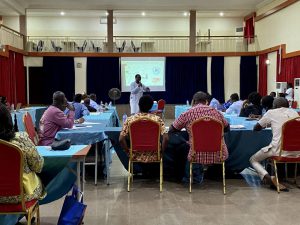The National Social Safety Nets Coordinating Office (NASSCO) over the weekend embarked on a two- day sensitization training of Information Officers from the State Operations Coordinating Units (SOCU) in 36 states and the FCT. The training is designed to adequately prepare the officers for the task of creating mass awareness preparatory for the nationwide roll-out of the Rapid Response Register (RRR) scheme.
Declaring the Workshop open, National Coordinator of NASSCO Mr. Iorwa Apera, represented by NASSCO Communications Manager, Joe Abuku, welcomed and thanked participants for making it to Akwanga, the venue of the training at the shortest notice.
Mr. Apera disclosed that though the RRR has been piloted in the FCT and Lagos State, it was important for all Information Officers under the project to come together for collective knowledge of what the project is all about. The training he said would explore the best engagement and campaign strategies that would deepen understanding of the intervention and strengthen full participation by those the project targets.
The National Coordinator further charged state Information Officers to ensure that they pay keen attention to the technical session and plan a participatory approach for their awareness campaigns as this will enhance high level of understanding participation in targeted communities.
He reminded participants go about their sensitization work constantly mindful of President Buhari’s vision to move 100 million Nigerians out of Poverty.
In his presentation, Head of NASSCO’s Information Systems Unit, Sesugh Nongo, (Ph.D) disclosed that the Rapid Response Register is a shock response framework designed as a scale-up of the existing National Social Safety Nets Project (NASSP) through a partnership between the Federal Ministry of Humanitarian Affairs and the World Bank. He said the register will serve as database to provide emergency social assistance to mostly urban and semi-urban households made vulnerable by the economic shocks of the Covid pandemic and future challenging emergencies. He explained that the RRR will rely on satellite remote sensing technology, Machine Learning Algorithms and Big Data analysis to target households; further stressing that that despite the widespread impact of the pandemic on livelihoods, the Rapid Response Register will target households to the extent of the resources available
NASSCO’s Senior Data Analyst Murtala Mohammed shared lessons from the pilot phase of the RRR project. He said during the pilot, two wards from one local government each in Lagos and the FCT were used to test-run the register’s targeting mechanism. He stated further that NASSCO worked closely with independent survey firm to validate and interprete the data gathered via a USSD link made available to individuals who requested for assistance for their households. Mr. Mohammed reiterated that the collation of data for the RRR will be out-sourced to survey firms under the supervision of State Operations Coordinating Units (SOCUs).

Participants at the training.
Participants were also put through he grievance reporting mechanism for the project during a session led by Daniel Amba, who’s in charge of NASSCO’s Grievance Redress unit. He made the point about the importance of channels for members of the public to state any dissatisfaction they may have with implementation of the project, stressing further that the RRR implementation design provides for such channels.
The SOCU Information Officers worked in teams and came up with campaign strategies that would be most effective in their respective domains
The rapid response register is set for a country wide roll out in April 2021. It is expected that a total of twenty million Beneficiaries will be targeted, many of whom will receive some form of social assistance from the Federal Ministry of Humanitarian Affairs to cushion economic shocks they’ve been exposed to because of the pandemic